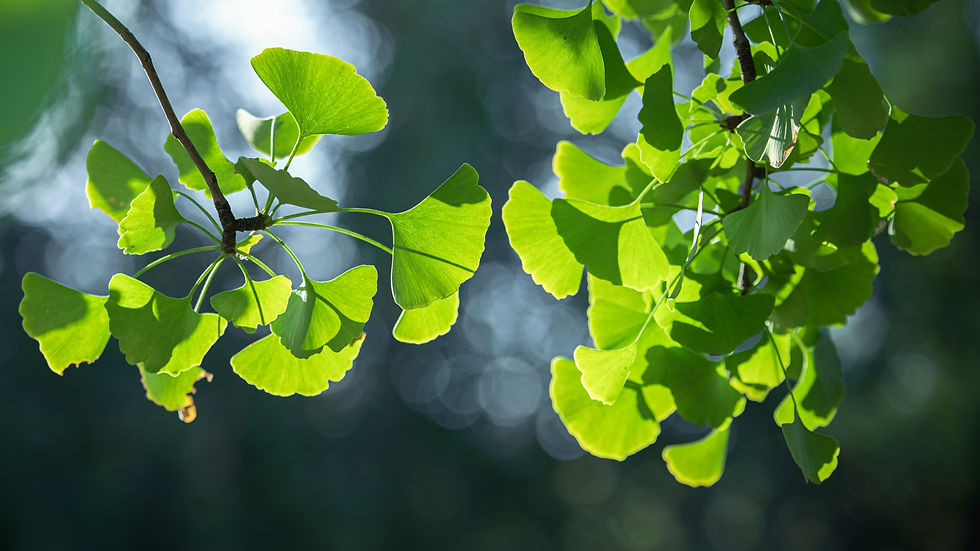Ginkgo: a natural remedy for altitude sickness
- Admin
- Oct 16, 2023
- 3 min read
Updated: Aug 11, 2024
 What is GINKGO? Identification name: Ginkgo biloba L. Family: Ginkgoaceae Habitat: native to East Asia Medicinal part: leaf Key chemical constituents: it contains aminoacids, flavonoids, proanthocyanidins. Specifically: quercetin is antibacterial, antioxidant, antineoplastic, anti-inflammatory; kaempferol is antibacterial and antioxidant; luteolin is antioxidant, anti-inflammatory, free radical scavenger, immunomodulator, antineoplastic, nephroprotective; ginkgetin is antineoplastic; amentoflavone is antiviral; ginkgolides A, B, C. Properties and uses: ginkgo is antioxidant, tissue perfusion enhancer, circulatory stimulant, nootropic, neuroprotective, anxiolytic, adaptogen. It can be used in cognitive deficiency, intermittent claudication, vertigo and tinnitus of vascular origin. Curiosity: this plant has a high resistance to drought, cold (-34°degrees) and air pollution. Other reported uses are asthma, hearing loss, altitude sickness. Traditionally, the nut and seed were also used. Caution: ginkgo is well-tolerated when used at the recommended dosage, and not for more than 6 consecutive months. Some patients may experience gastrointestinal symptoms, migraine, nausea, bruising, subarachnoid haemorrhages. Caution when used with anticoagulant and antiplatelet drugs as it can potentiate their effects, causing bleeding. What is HIGH ALTITUDE SICKNESS? High altitude is classified as: High: 1500-3500 meters above sea level Very high: 3500-5500 meters above sea level Extremely high: 5500-8850 meters above sea level. Atmospheric pressure progressively decreases as altitude increases. This means that a person who ascends to high altitude suffers a decrease in the concentration of oxygen in their blood because of the reduced amount of oxygen in inspired air. The brain detects this change in the blood and increases its signals to the skeletal muscles responsible for breathing. This makes the person to breathe more rapidly and deeply, and the increase in the amount of air inspired helps keep the blood oxygen concentration from falling as much as it otherwise would. The effects of lack of oxygen vary from one person to another, but most people who ascend rapidly to altitudes above 2500 meters, experience some degree of acute mountain sickness. You may have difficulty breathing (hypoxia), headache, dizziness, nausea, vomiting, insomnia, fatigue, and slower mental reactions. Over the course of several days, the symptoms of acute mountain sickness disappear, although maximal physical capacity remains reduced. Full recovery usually takes days, and patients must stay warm and well rested. | Ginkgo biloba is one of the most investigated drugs for the prevention of acute altitude sickness. Research shows that if you take ginkgo 4–5 days before you go to a high-altitude place, it helps reduce the incidence of acute mountain sickness. Ginkgo improves blood flow and oxygen delivery to the brain and other tissues. |
References Barnes, Joanne, et al. Herbal Medicines. 3rd ed., Pharmaceutical Press, 2007. Bone, Kerry, and Simon Mills. Principles and Practice of Phytotherapy: Modern Herbal Medicine. 2nd ed., 2013. Braun, Lesley, and Marc Cohen. Herbs & Natural Supplements: An Evidence-Based Guide. Vol. 2. 4th ed., Churchill Livingstone Elsevier, 2015. Campanini, Enrica. Dizionario di fitoterapia e piante medicinali. Tecniche nuove, 2012. Chemistry from PubChem. De Smet, Peter A. G. M., et al. Adverse Effects of Herbal Drugs. Vol. 3, Springer Berlin Heidelberg, 1997. Koda-Kimble, Mary Anne. Applied Therapeutics: The Clinical Use of Drugs. 9th ed., Lippincott Williams & Wilkins, 2009. Savioli, Gabriele, et al. "Pathophysiology and therapy of high-altitude sickness: practical approach in emergency and critical care." Journal of Clinical Medicine 11.14 (2022): 3937. Vander, Arthur J., et al. Human Physiology: the Mechanisms of Body Function. 8th ed., McGraw-Hill, 2001. Natural Medicines 2019. |


Comments